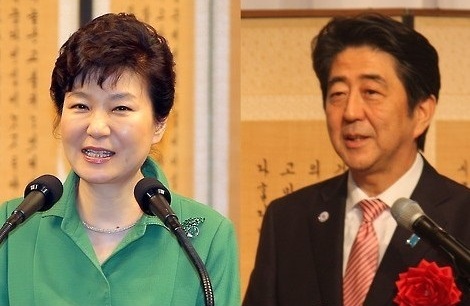- California Assembly OKs highest minimum wage in nation
- S. Korea unveils first graphic cigarette warnings
- US joins with South Korea, Japan in bid to deter North Korea
- LPGA golfer Chun In-gee finally back in action
- S. Korea won’t be top seed in final World Cup qualification round
- US men’s soccer misses 2nd straight Olympics
- US back on track in qualifying with 4-0 win over Guatemala
- High-intensity workout injuries spawn cottage industry
- CDC expands range of Zika mosquitoes into parts of Northeast
- Who knew? ‘The Walking Dead’ is helping families connect
S. Korea, Japan signal readiness to restore relations
President Park Geun-hye and Japanese Prime Minister Abe Shinzo showed willingness on Monday to advance the frosty ties between the two countries.
Park and Abe attended ceremonies in Seoul and Tokyo, respectively, to mark the 50th anniversary of diplomatic relations between Korea and Japan.
“This year is a historic opportunity for the two nations to move toward the future,” Park said in the Japanese embassy-hosted reception. ”To do so, the two nations should cooperate to unravel the complicated web of factors hampering the advancement of bilateral ties.”
She also said that it was important to put down the heavy burden of history for reconciliation and co-prosperity.
“When the two sides begin such efforts, this year will be the year for Korea and Japan to jointly begin a new future,” Park said.
In response, Abe stressed the importance of mending ties between the two countries.
“The expansion of cooperation between Korea and Japan is important to peace and stability in the Asia-Pacific region,” he said in the event, held by the Korean Embassy in Tokyo, which Foreign Minister Yun Byung-se attended and read Park’s message.
“Korea and Japan are the most important neighbors for each other.”
The Prime Minister also said that bilateral cooperation on regional and international issues will lead to building a new relationship.
“In order to advance ties between the two countries, I will make efforts with President Park,” he added.
The reconciliatory messages came as a lot of signs have emerged that both sides are trying to improve their strained diplomatic ties.
President Park and Prime Minister Abe decided Sunday to attend the anniversary ceremonies, while Foreign Minister Yun made his first visit to Japan as Seoul’s top diplomat.
“In order to create a positive atmosphere for bilateral rapprochement, the two leaders have decided to participate in the receptions,” a high-ranking government official said.
Park has called for the Japanese government to resolve the issue of “comfort women,” who were forced into prostitution for the Japanese army before and during World War II, before holding a summit with Abe.
But the Park administration has provided a hint of a shift in its position
Yoo Heung-soo, Korean ambassador to Japan, said in an interview with Japan’s Mainichi Shimbun, Saturday, that the issue was not a precondition for a summit, hoping that a Park-Abe meeting will take place this autumn.
In addition, Park pledged to focus on moving forward with Japan, saying to her senior secretaries, “I hope that you will take care of the development of future-oriented bilateral relations on such issues that require cooperation.”
Ahead of the reception, Park received Fukushiro Nukaga, Abe’s special envoy who heads a group of Japanese lawmakers promoting friendly ties between Seoul and Tokyo.
During the meeting, Park expressed the hope that Abe will uphold past government apologies and expressions of remorse for Japan’s wartime atrocities in his planned Aug. 15 statement to mark the 70th anniversary of the end of World War II.
In response, Nukaga said the Japanese premier is committed to honoring the Kono and Murayama Statements, while offering condolences to the sex slavery victims.
Earlier in the day, Foreign Minister Yun, who made his first trip to Japan since taking office in 2013, paid a courtesy call on Abe at his official residence and delivered Park’s message hoping that Seoul and Tokyo will mend fences with each other.

















